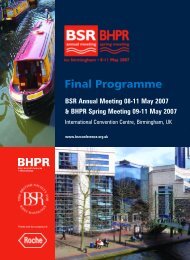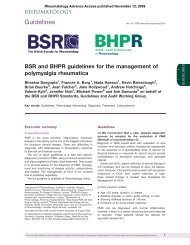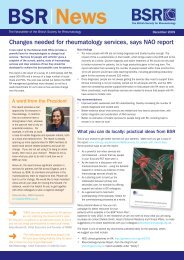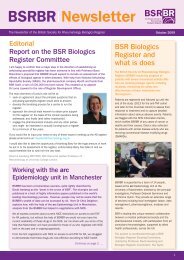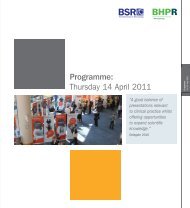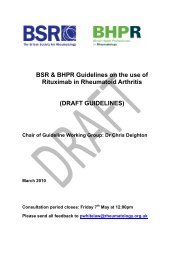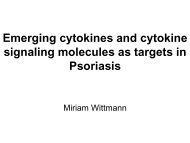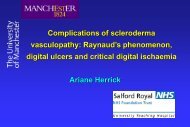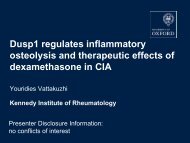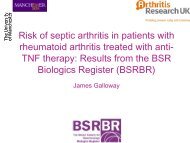Guidelines for the treatment of psoriatic arthritis with biologics
Guidelines for the treatment of psoriatic arthritis with biologics
Guidelines for the treatment of psoriatic arthritis with biologics
You also want an ePaper? Increase the reach of your titles
YUMPU automatically turns print PDFs into web optimized ePapers that Google loves.
e<strong>for</strong>e anti‐TNF <strong>the</strong>rapy is started. Prior to starting anti‐TNF <strong>the</strong>rapy consideration <strong>of</strong> prophylactic anti‐TB<br />
<strong>the</strong>rapy (as directed by <strong>the</strong> latest National guidelines) should be given to patients <strong>with</strong> evidence <strong>of</strong> potential<br />
latent disease (Grade B). Physicians should be vigilant <strong>for</strong> <strong>the</strong> development <strong>of</strong> mycobacterial infections<br />
throughout <strong>treatment</strong> <strong>with</strong> anti‐TNF and <strong>for</strong> at least 6 months after discontinuation (Grade C). If patients<br />
develop evidence <strong>of</strong> mycobacterial infection whilst on anti‐TNF <strong>the</strong>rapy <strong>the</strong>y should receive a full course <strong>of</strong> antimycobacterial<br />
chemo<strong>the</strong>rapy – <strong>the</strong> anti‐TNF <strong>the</strong>rapy may be continued during this time if clinically indicated<br />
(Grade C) 4 .<br />
Recommendation nine<br />
Anti‐TNF <strong>the</strong>rapy should not be initiated or continued in <strong>the</strong> presence <strong>of</strong> serious active infection, but can be<br />
recommenced once <strong>the</strong> infection has resolved clinically (Grade B). Anti‐TNF <strong>the</strong>rapy should be used <strong>with</strong><br />
caution in patients at high infection risk after discussing <strong>the</strong> relative risks and benefits (Grade C). 4<br />
Recommendation ten<br />
Patients on anti‐TNF <strong>the</strong>rapy should be in<strong>for</strong>med <strong>of</strong> appropriate food hygiene. There should be a high index <strong>of</strong><br />
suspicion <strong>for</strong> <strong>the</strong> possibility <strong>of</strong> atypical or opportunistic infections, and <strong>treatment</strong> should be stopped and advice<br />
sought in suspected cases (Grade B) 4<br />
Recommendation eleven<br />
Patients at risk should be screened <strong>for</strong> human immunodeficiency virus (HIV), and all patients should be<br />
screened <strong>for</strong> hepatitis B virus (HBV) and hepatitis C virus (HCV) prior to anti‐TNF <strong>the</strong>rapy (Grade C).<br />
HIV or HCV infection should not preclude <strong>treatment</strong> <strong>with</strong> anti‐TNF <strong>the</strong>rapy although <strong>treatment</strong> should only be<br />
commenced in those <strong>with</strong> well controlled disease and <strong>with</strong> appropriate monitoring under <strong>the</strong> care <strong>of</strong> a<br />
Hepatologist or HIV specialist (Grade B).<br />
Anti‐TNF <strong>the</strong>rapy in those <strong>with</strong> chronic HBV should be approached <strong>with</strong> caution given <strong>the</strong> potential risk <strong>of</strong><br />
reactivation and fulminant hepatitis. Anti‐TNF <strong>the</strong>rapy should only be commenced in those <strong>with</strong> well controlled<br />
disease, <strong>with</strong> appropriate antiviral <strong>treatment</strong> and regular monitoring in collaboration <strong>with</strong> a Hepatologist.<br />
Consideration should be given to vaccinating those at risk <strong>of</strong> HBV prior to <strong>treatment</strong> (Grade C).<br />
Recommendation twelve<br />
Anti‐TNF <strong>the</strong>rapy should be avoided in patients <strong>with</strong> a current or prior history <strong>of</strong> malignancy unless <strong>the</strong><br />
malignancy was diagnosed and treated more than 5 years ago and/or where <strong>the</strong> likelihood <strong>of</strong> cure is high. All<br />
patients should be encouraged to participate in national cancer screening programmes appropriate <strong>for</strong> <strong>the</strong>ir<br />
age and gender. Patients on anti‐TNF should be regularly screened <strong>for</strong> skin cancers (including melanoma)<br />
especially if <strong>the</strong>ir background risk is high. Anti‐TNF <strong>the</strong>rapy is relatively contra‐indicated in patients who have<br />
had prior <strong>treatment</strong> <strong>with</strong> >200PUVA and/or >350 UVB <strong>treatment</strong>s, especially when this has been followed by<br />
<strong>treatment</strong> <strong>with</strong> ciclosporin (Grade C) 2<br />
Recommendation thirteen<br />
Anti‐TNF agents should ideally be stopped prior to pregnancy and restarted after end <strong>of</strong> lactation or delivery if<br />
not breast feeding. Management should be in accordance <strong>with</strong> BSR guidelines <strong>for</strong> rheumatoid <strong>arthritis</strong> 4 and<br />
<strong>the</strong> BAD guidelines (Grade C) 2<br />
33



